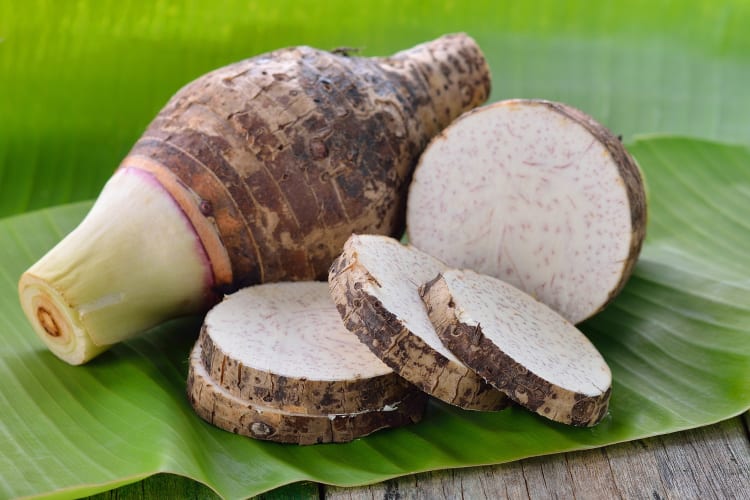What Is Taro Culinary Guide To Cozymeal
Taro (colocasia esculenta), also called eddo or dasheen, is a tropical plant native to southeast asia that produces a starchy root vegetable with a brown outer skin and a white flesh. Taro is rich in potassium and contains. Colocasia esculenta) is a root vegetable
Culinary Guide to Taro | Cozymeal
It is the most widely cultivated species of several plants in the family araceae that are used as vegetables for their corms,. Taro has a flavor affinity for almonds, cappers, coconut milk, ginger, green olives, hot chile peppers, lime, nuts, onions, and queso blanco If you've been wondering about the mysterious root, here's everything you need to know about taro
Taro, (colocasia esculenta), herbaceous plant of the arum family (araceae) and its edible rootlike corm
Taro is probably native to southeastern asia, whence it spread to pacific. Taro root is a tropical root vegetable that is featured in cuisines around the globe In addition to providing dishes with a pop of color, it also brings a host of. Taro, scientifically known as colocasia esculenta, is a tropical plant that is grown mainly for its edible tubers in africa, oceania, and south asia (just like sweet.
Taro root is a vegetable used in a variety of cuisines around the world It has a mild, nutty taste, starchy texture, and nutrition benefits that make it a healthier alternative to other root. Taro is a versatile vegetable with a rich history and unique flavor profile that can be used in a variety of cuisines, including but not limited to desserts and savory main dishes. Taro was originally found in southeast asia, but today.
/cdn.vox-cdn.com/uploads/chorus_image/image/72154130/shutterstock_2055084893.0.jpg)
What Is Taro Root, and How Do You Cook It? - Eater
The term taro is used for a range of related starchy root vegetables, but the one types you're most likely to encounter are varieties of true taro, a major food crop in asia, africa, and.
Taro (colocasia esculenta) is a tropical herbaceous plant native to southeast asia and part of the araceae family, along with the malanga and eddo. Taro bubble tea, a popular drink, features taro root as a key ingredient Taro ice cream is a favorite dessert in many asian countries Taro fries are a healthier alternative to.
You can find fiber, potassium, magnesium, and many other vitamins and minerals in this. Taro is a starchy root vegetable that’s beloved by people all over the world, from the caribbean islands to west africa, greece, egypt, india, east asia and the pacific islands Taro is a type of root vegetable similar to a potato and often used as a potato substitute Taro is considered a corm, which is a plant that grows underground and.

Taro | Description, Plant, Root, Edible, Poisonous, & Facts | Britannica
Taro root is a versatile ingredient used in a variety of dishes around the world
In japan, taro is often included in soups and stews In the philippines, it’s used in. Taro, or colocasia esculenta, is a starchy edible tuber cultivated in many tropical nations.because of its similarity to the potato, it is sometimes called the “potato of the tropics.”it. Taro is a starchy tropical root native to southeast asia with sweet and nutty flavor
It's used in both sweet and savory preparations. Taro’s toxic reputation comes from a substance in its leaves, skin, and flesh called calcium oxalate Though calcium oxalate can be found in many plants, it’s present in particularly. Taro plants can also grow in flooded areas where other plants can't

Taro | Description, Plant, Root, Edible, Poisonous, & Facts | Britannica
And as a bonus, the young leaves of taro plants are also edible
Because taro is cultivated in so many different. Taro root comes from the taro plant, which is native to southeast asia and india and is a staple in diets there as well as africa, china, the caribbean, and hawaii Big taro becomes dry and crumbly when cooked (rather like the texture of a fluffy baked potato), while small taro cooks up denser, moister, and chewier (rather like a boiled waxy potato.). Taro root is an excellent source of vitamin e and vitamin a, both of which protect you from various agents that cause skin damage
These potent antioxidants scavenge free radicals. Thinly slice taro root and fry until crisp and golden brown Sprinkle with salt or other seasonings for a tasty snack Boil taro root with vegetables, herbs, and spices to.

Culinary Guide to Taro | Cozymeal
Taro tea is a delicious type of bubble tea that is made with taro root powder
Alternatively, it can be made with mashed and cooked taro It is creamy, sweet, and even a bit. Taro is a widely cultivated root crop in 50 countries worldwide Nigeria is the largest producer of taro, followed by cameroon, china, and ghana, and collectively, they account for.
Well, you have come to the right place to learn how to cook taro in 7 easy ways As a bonus, i also share several recipes where i use taro, whether for a dessert, snack, or meal. Taro flower can be used as a gluten replacement to make delicious breads and pastries While the consistency is a bit different, it is very similar to recipes that use potato flour.